| Srl | Item |
| 1 |
ID:
171170
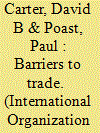

|
|
|
|
|
| Summary/Abstract |
Since trade must cross borders, to what extent do border walls affect trade flows? We argue that border walls can reduce trade flows. Even if the objective is to only stem illicit flows, border walls heighten “border effects” that can also inhibit legal cross-border flows. Using a gravity model of trade that reflects recent developments in both economic theory and econometrics, we find that the creation of a wall is associated with a reduction in legal trade flows between neighboring countries. We provide a battery of evidence that suggests this reduction is not simply a function of worsening bilateral relations. Our findings have implications for understanding how governments have taken measures to assert sovereign control of their borders in an age of increasing economic globalization.
|
|
|
|
|
|
|
|
|
|
|
|
|
|
|
|
| 2 |
ID:
161133
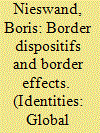

|
|
|
|
|
| Summary/Abstract |
The article argues that transnationalism and border studies offer complementary perspectives where each can inspire the other. Based on two case studies, the notions of border dispositifs and border effects are developed as analytical lenses for researching and conceptualising the nexus between transnational migration and border regimes. While the border dispositifs perspective facilitates a de-reification of borders and shifts the focus on how inequalities are produced by specific border locations and situations, the border effects perspectives reifies the notion of border in order to capture structural effects which border regimes have on transnational migrants’ lives. Finally, the article introduces the notion of border capital to theorise effects that borders have on resources of persons who are mobile across borders. It aims at capturing the impact of borders on inequalities between mobile and sedentary persons.
|
|
|
|
|
|
|
|
|
|
|
|
|
|
|
|
| 3 |
ID:
159036
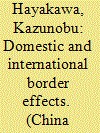

|
|
|
|
|
| Summary/Abstract |
Previous studies in the border-effect literature surprisingly found that domestic border effects are larger than international border effects (e.g., in the United States or Brazil). One interpretation of this result is that these estimates include the effects of producer agglomeration. Therefore, in this study, we estimate those border effects exclusively for transactions for final consumption, in which such agglomeration forces will be weak, in China and Japan. As a result, we found larger international border effects and could not find a significant role for producer agglomeration in the estimates of border effects. We also found that China's accession to the World Trade Organization reduces border effects in trading between China and Japan but does not decrease domestic border effects.
|
|
|
|
|
|
|
|
|
|
|
|
|
|
|
|
| 4 |
ID:
158573
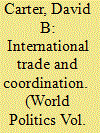

|
|
|
|
|
| Summary/Abstract |
This article examines how the institutional design of borders affects international trade. The authors explore variation in the effects of borders by comparing new international borders that follow precedent and thus have a prior institutional history with new international borders that lack such an institutional history. The former minimally disrupt—or restore—previous economic networks, while the latter fundamentally disrupt existing economic networks. A variety of empirical tests show that, consistent with this institutional perspective on borders, new international boundaries that follow precedent are associated with significantly faster recovery and greater increase in subsequent trade flows. By contrast, when new international borders are truly new, they disrupt local economic networks, introduce new transaction costs, and impose higher adjustment costs on states, which the authors show to have long-term deleterious effects on trade.
|
|
|
|
|
|
|
|
|
|
|
|
|
|
|
|
| 5 |
ID:
094662
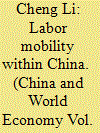

|
|
|
|
|
| Publication |
2010.
|
| Summary/Abstract |
Labor migration is institutionally restricted within China under the hukou system, China's registration system. However, what is the pecuniary impact of labor immobility on interregional wage inequality? To answer this question, we derive a simple wage gap equation including educational attainment, market potential and provincial border indicators. The regressions based on city and sector-level data show that, other things being equal, the wage dispersions within Chinese provincial borders are significantly less pronounced than those among provinces. Such border effects on spatial wage differentials, which have been shown to pervasively exist in all sectors considered in the present paper, reflect the distortions generated by migration controls. Finally, we show that despite the recent hukou reforms aimed at relaxing the restrictions on population movement, border effects appear to persisted over the period 2003-2005
|
|
|
|
|
|
|
|
|
|
|
|
|
|
|
|